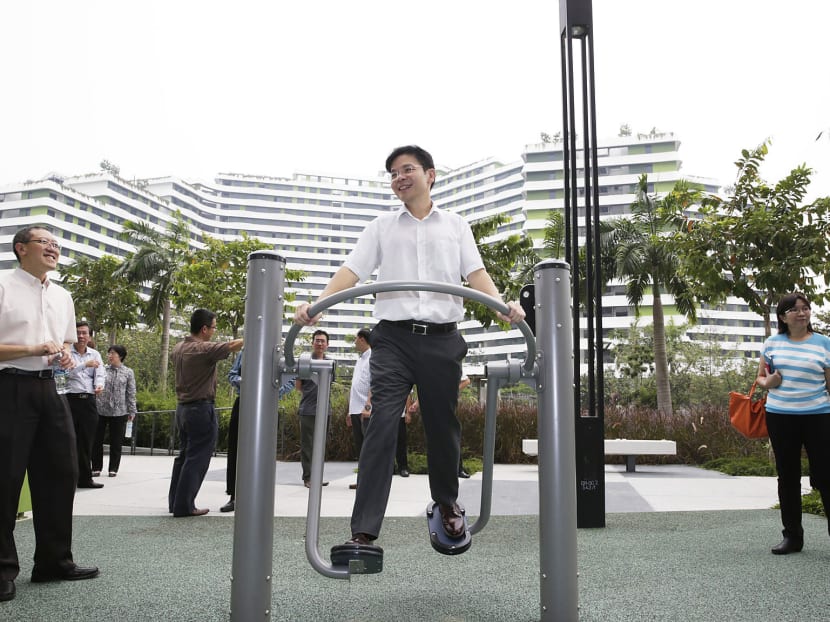BTO supply to go up next year to cope with greater demand
SINGAPORE — After cutting back on public housing supply last year, the Housing and Development Board (HDB) will be turning on the tap again next year, in anticipation of higher demand because of recent policy changes.

During a visit at Waterway Terraces at at Punggole on Oct 16, Minister for National Development Lawrence Wong (centre) said it was still not time to ease the cooling measures for the private property market as the price adjustment seen has been moderate. Photo: Wee Teck Hian
SINGAPORE — After cutting back on public housing supply last year, the Housing and Development Board (HDB) will be turning on the tap again next year, in anticipation of higher demand because of recent policy changes.
Minister for National Development Lawrence Wong, who took over the portfolio at the start of this month, said today (Oct 16) that the number of Build-to-Order flats pushed into the market in 2016 will be a “slight adjustment” from this year’s supply of 15,000 units, but will not go past the 20,000-mark.
The actual figure will be finalised after the numbers come in for next month’s launch of a bumper crop of 12,000 units, but Mr Wong stressed that the Government will continue moving in the direction of tapering the supply of new flats.
Speaking to the media on the sidelines of a visit to Waterway Terraces estate in Punggol, the minister said: “We may need to make some temporary adjustments in order to accommodate this higher demand in housing arising from policy changes (and) to maintain the supply demand equilibrium.”
Property analysts, however, raised fears of a bloated housing market and called for any increase in supply to be marginal.
In August, several housing policy tweaks were announced. These include the income ceiling for BTO flat buyers being raised from S$10,000 to S$12,000, and changes to the Special Central Provident Fund Housing Grant to help the middle- and lower-income households buy their first flat. The Two-Room Flexi scheme was also introduced for seniors, offering buyers flexibility in lease lengths.
Mr Wong said today that housing supply was increased in recent years — 25,000 were released each year from 2011 to 2013 — to clear the backlog of first-time buyers. Now that that is done, the ramp-up must be tapered off to prevent an oversupply situation — last year, supply was cut to 22,400 units, and this year, 15,000 flats will be put on the market.
“Without the policy changes, we will probably have to continue with that same trajectory but with the changes in policy, which changes the dynamics and equilibrium, then we have to make adjustments,” added Mr Wong.
Some property analysts raised caution over increasing supply of BTO flats.
Property firm Century 21 chief executive Ku Swee Yong questioned how much the raised income ceiling will have on housing demand, citing how response for recent executive condominium launches was lukewarm.
“The fact is we have already fed the market with so much supply that we are all full already,” said Mr Ku.
Higher earners can enter the market for other types of homes immediately, rather than wait for a BTO flat, he said. If there is an oversupply situation, retirees could be one group that suffers because they might have to sell their flats at lower prices, he added.
Mr Eugene Lim, key executive officer of ERA real estate agency, said that even if the increased supply was a temporary measure, “this would inevitably add to the already substantial supply coming up in the next few years”.
“Given that Singapore’s population grew by its slowest rate in a decade in the year ending June 2015, the Government has to be careful to balance its policies such that it avoids a demand supply mismatch,” said Mr Lim.
Mr Chris Koh, director of property consultancy Chris International, was less worried, noting that the HDB can quickly scale back on supply if orders are not coming through. Supply could be increased by just 10 to 15 per cent, to between 16,000 and 18,000 units, to “soak up” any extra demand from the policy changes, he added.
Meanwhile, Mr Wong reiterated that it is still not time to ease the cooling measures for the private property market even though the market is stabilising. “The price adjustment that we have seen so far has been moderate as compared to the price increase that we saw take place very quickly in the past few years,” he added. “We don’t want to risk a premature market rebound.”
He added that the Government will continue to watch the situation and internal and external economic conditions, and respond accordingly.






